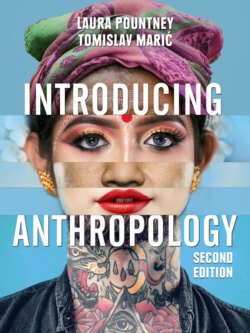Читать книгу Introducing Anthropology - Laura Pountney - Страница 75
Ethical issues
ОглавлениеEthics refers to moral issues of right and wrong. Ethnographers are obliged to follow ethical principles before, during and after their fieldwork. There are several major anthropological associations that have created codes of ethics. In short, ethnographers have to respect the dignity of people they study as well as take responsibility for how they use their findings after the research is completed.
The Association of Social Anthropologists of the UK and Commonwealth and the American Anthropological Association (AAA) have set out guidelines for the conduct of research, including the principles set out in the box below.
| Informed consent | Research participants should be offered the right to refuse to take part. The researcher should tell them about all relevant aspects of the research so that they can make an informed decision. Consent should be obtained before research begins. |
| Confidentiality and privacy | Researchers should keep the identity and personal details of participants confidential in order to help prevent possible negative effects on them. |
| Effects on research participants | Researchers need to be aware of the possible negative effects on participants, such as police intervention, harm to education or employment, social exclusion and psychological damage. If someone is asked to talk about a sensitive event in their life, such as abuse or rape, they may also find this upsetting. |
| Covert research | This is when the researcher’s identity and purpose are hidden from the people being studied. It can create serious ethical problems, such as deceiving or lying to people in order to win their trust or obtain information. It is impossible to gain informed consent while at the same time keeping the research or its purpose secret. Anthropology does not use covert observation during research. However, some anthropologists argue that the use of covert methods may be justified in certain circumstances (see Chapter 14). |
| Involvement in illegal acts/danger | If the researcher is investigating a deviant gang or group, for example, they may have to take part in or be seen to condone illegal behaviour. They may also be in danger, particularly if the gang members think that they might be deceived (see Thomas Ward’s study, pp. 32–3). |
covert observation When a study is carried out ‘under cover’: the researcher’s identity and purpose of research are concealed from the group
Ethical guidelines for ethnographic research from the AAA The goal of anthropology is to spread anthropological knowledge and its use to solve human problems. Anthropologists work in a variety of contexts studying all aspects of human experiences; in doing so, they face numerous ethical dilemmas. What is presented here is intended to reflect core principles shared across subfields and contexts of practice (Principles of Professional Responsibility, issued by the AAA). They cover a range of guidelines put together by the AAA to address the particular issues related to anthropological study, including:
do no harm;
be open and honest regarding your work;
obtain informed consent and necessary permissions;
weigh competing ethical obligations due collaborators and affected parties;
make your results accessible;
maintain respectful and ethical professional relationships.
